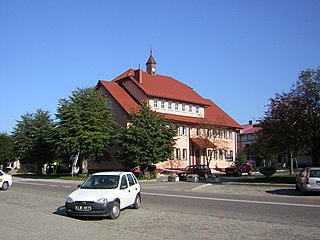
Warmian-Masurian Voivodeship or Warmia-Masuria Province or Warmia-Mazury Province, is a voivodeship (province) in northeastern Poland. Its capital and largest city is Olsztyn. The voivodeship has an area of 24,192 km2 (9,341 sq mi) and a population of 1,427,091.

Działdowopronounced [d͡ʑau̯ˈdɔvɔ] is a town in north-central Poland with 24,830 inhabitants (2006), the capital of Działdowo County. Situated in the Warmian-Masurian Voivodeship, Działdowo belonged previously to Ciechanów Voivodeship (1975–1998). The town is a major railroad junction connecting the capital city of Warsaw with Gdańsk and Olsztyn to the north.

Dąbrówno is a village and the seat of a gmina (municipality) in Ostróda County, Warmian-Masurian Voivodeship in northern Poland. It lies approximately 30 kilometres (19 mi) south of Ostróda and 50 km (31 mi) south-west of the regional capital Olsztyn.

Płośnica is a village in Działdowo County, Warmian-Masurian Voivodeship, in northern Poland. It is the seat of the gmina called Gmina Płośnica. It lies approximately 13 kilometres (8 mi) north-west of Działdowo and 65 km (40 mi) south-west of the regional capital Olsztyn.

Olsztynek is a town in Olsztyn County, in Warmian-Masurian Voivodeship of Poland. It is the administrative seat of Gmina Olsztynek.

Susz is a town in Iława County, Warmian-Masurian Voivodeship, Poland, with 5,600 inhabitants (2004).

Ardapy is a village in the administrative district of Gmina Bartoszyce, within Bartoszyce County, Warmian-Masurian Voivodeship, in northern Poland, close to the border with the Kaliningrad Oblast of Russia. It lies approximately 3 kilometres (2 mi) south-west of Bartoszyce and 53 km (33 mi) north of the regional capital Olsztyn.

Gąsiorowo is a village in the administrative district of Gmina Działdowo, within Działdowo County, Warmian-Masurian Voivodeship, in northern Poland. It lies approximately 17 kilometres (11 mi) north of Działdowo and 50 km (31 mi) south-west of the regional capital Olsztyn.

Gnojno is a village in the administrative district of Gmina Działdowo, within Działdowo County, Warmian-Masurian Voivodeship, in northern Poland. It lies approximately 10 kilometres (6 mi) south-west of Działdowo and 74 km (46 mi) south of the regional capital Olsztyn.

Kramarzewo is a village in the administrative district of Gmina Działdowo, within Działdowo County, Warmian-Masurian Voivodeship, in northern Poland. It lies approximately 12 kilometres (7 mi) north of Działdowo and 56 km (35 mi) south-west of the regional capital Olsztyn.

Myślęta is a village in the administrative district of Gmina Działdowo, within Działdowo County, Warmian-Masurian Voivodeship, in northern Poland. It lies approximately 14 kilometres (9 mi) north-west of Działdowo and 58 km (36 mi) south-west of the regional capital Olsztyn.

Mławka is a village in the administrative district of Gmina Iłowo-Osada, within Działdowo County, Warmian-Masurian Voivodeship, in northern Poland. It lies approximately 5 kilometres (3 mi) south-east of Iłowo-Osada, 15 km (9 mi) south-east of Działdowo, and 73 km (45 mi) south of the regional capital Olsztyn.

Sochy is a village in the administrative district of Gmina Iłowo-Osada, within Działdowo County, Warmian-Masurian Voivodeship, in northern Poland. It lies approximately 3 kilometres (2 mi) east of Iłowo-Osada, 13 km (8 mi) south-east of Działdowo, and 70 km (43 mi) south of the regional capital Olsztyn.

Łężany is a village in the administrative district of Gmina Reszel, within Kętrzyn County, Warmian-Masurian Voivodeship, in northern Poland. It lies approximately 10 kilometres (6 mi) south of Reszel, 21 km (13 mi) south-west of Kętrzyn, and 47 km (29 mi) north-east of the regional capital Olsztyn.

Naterki is a village in the administrative district of Gmina Gietrzwałd, within Olsztyn County, Warmian-Masurian Voivodeship, in northern Poland. It lies approximately 10 kilometres (6 mi) east of Gietrzwałd and 11 km (7 mi) south-west of the regional capital Olsztyn.

Łutynówko is a village in the administrative district of Gmina Olsztynek, within Olsztyn County, Warmian-Masurian Voivodeship, in northern Poland. It lies approximately 4 kilometres (2 mi) south-east of Olsztynek and 27 km (17 mi) south-west of the regional capital Olsztyn.

Borki Rozowskie is a village in the administrative district of Gmina Rozogi, within Szczytno County, Warmian-Masurian Voivodeship, in northern Poland. It lies approximately 13 kilometres (8 mi) south of Rozogi, 24 km (15 mi) east of Szczytno, and 62 km (39 mi) south-east of the regional capital Olsztyn.

Kusowo is a village in the administrative district of Gmina Szczecinek, within Szczecinek County, West Pomeranian Voivodeship, in north-western Poland. It lies approximately 13 kilometres (8 mi) north-west of Szczecinek and 137 km (85 mi) east of the regional capital Szczecin.
The 33rd Fusiliers "Count Roon" was a regiment of the Imperial German Army through the First World War.

ZawkrzeZawkrze Land, is a small historic region of Poland (ziemia), located in northern Mazovia, along the border with Masuria. Its approximate area is 1,784 km2 (689 sq mi), and the population is about 114,000. Currently, Zawkrze has three towns, and more than 200 villages. Its name comes from the Wkra river – Zawkrze means the land behind the Wkra, from the perspective of Płock, historic capital of Mazovia. The largest town of the region is Mława, while historic capital of Zawkrze is Szreńsk.















